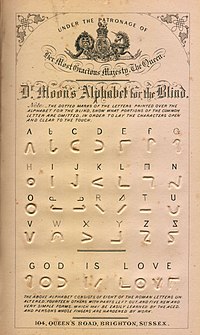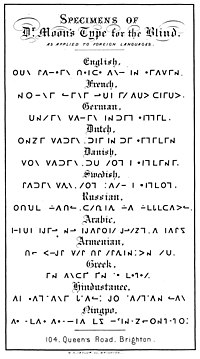From Wikipedia, the free encyclopedia
The Moon System of Embossed Reading (commonly known as the Moon writing, Moon alphabet, Moon type or Moon code) is a writing system for the blind, using embossed symbols mostly derived from the Roman alphabet (but simplified). It is claimed by its supporters to be easier to understand than Braille, though it is mainly used by people who have lost their sight as adults, and thus already have knowledge of the shapes of letters.
[edit] History

Dr Moon's Alphabet for the Blind, from his
Light for the Blind, published in 1877
Moon type was developed by Dr William Moon (1818–1894), a blind Englishman living in Brighton, East Sussex. After a bout of scarlet fever, Moon lost his sight at age twenty-one. Like many who lost their sight after childhood, he found Braille to be unsatisfactory. He first formulated his ideas in 1843 and published the scheme in 1845.
Rather than the dots of Braille, Moon Writing is made up of raised curves, angles, and lines. Its entire alphabet is made up of only nine glyphs in various orientations. In more advanced forms of Moon Writing, the characters can represent individual sounds, parts of words, whole words or numbers. About nine hundred Moon characters fit on one 10 in × 12 in page (about seven hundred on an A4- or US Letter-sized page).
Because it takes much longer to produce a work in Moon, Braille is much more common. In fact, Moon Writing has diminished in popularity so much that it is only in use by about four hundred people, most of whom reside in England. It is still possible to obtain literature in Moon type from the National Library for the Blind in Stockport; however, outside the United Kingdom it is not widely known.
[edit] Letters

[edit] Numbers

Specimens of Dr Moon's Type for the Blind as applied to foreign languages, from his
Light for the Blind, published in 1877
| Start |
 |
| 1 |
 |
| 2 |
 |
| 3 |
 |
| 4 |
 |
| 5 |
 |
| 6 |
 |
| 7 |
 |
| 8 |
 |
| 9 |
 |
| 0 |
 |
[edit] References
[edit] External links




